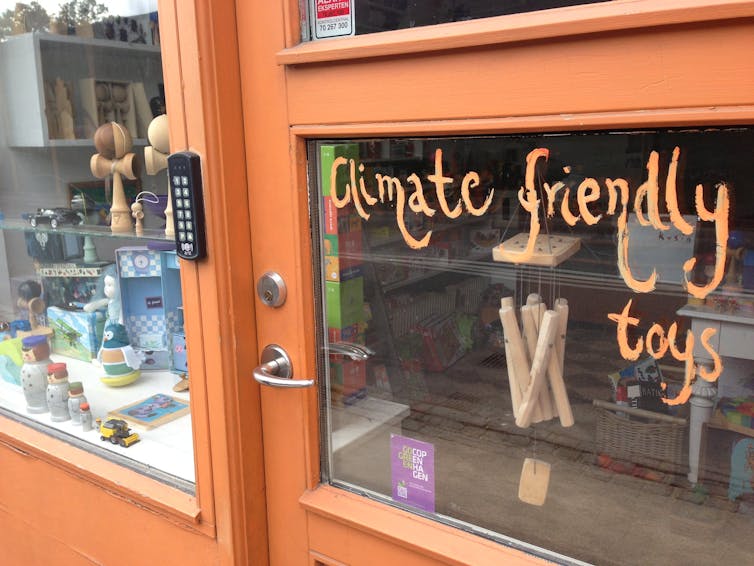are consumers willing to pay more for climate-friendly products?
- Written by Gary Mortimer, Professor of Marketing and Consumer Behaviour, Queensland University of Technology
 CC BY-ND
Climate Explained is a collaboration between The Conversation, Stuff and the New Zealand Science Media Centre to answer your questions about climate change.
If you have a question you’d like an expert to answer, please send it to climate.change@stuff.co.nz
I’m seeing quite a few “climate-friendly” products at the supermarket. Are consumers willing to pay more for these? And how can we encourage people to make good choices?
Shoppers once selected grocery products based simply on price or brand, but now attributes such as “climate-friendly” or “eco-friendly” are part of the consideration.
The latest IAG New Zealand Ipsos poll found almost four out of five people (79%) say climate change is an important issue for them, the same number as last year’s poll.
An international study of 20,000 customers by grocery brand giant Unilever identified one in three (33%) people were choosing to buy from brands they believe are doing environmental good.
Read more:
Green is the new black: why retailers want you to know about their green credentials
But research continues to show few consumers who report positive attitudes toward eco-friendly products actually follow through with their wallets.
Green, eco-friendly, climate-friendly products — confused?
Colloquially, use of the word “green” is applied broadly to almost everything related to benefiting the environment, from production and transportation to architecture and even fashion.
Eco-friendly isn’t quite so broad and defines products or practices that do not harm the Earth’s environment.
Climate-friendly defines products that reduce damage specifically to the climate.
All these terms are used in labelling to make us feel good if we buy products claimed to minimise harm to the planet and the environment.
Some brands are even moving beyond simply eco-friendly and now seek to claim their products are climate-neutral.
CC BY-ND
Climate Explained is a collaboration between The Conversation, Stuff and the New Zealand Science Media Centre to answer your questions about climate change.
If you have a question you’d like an expert to answer, please send it to climate.change@stuff.co.nz
I’m seeing quite a few “climate-friendly” products at the supermarket. Are consumers willing to pay more for these? And how can we encourage people to make good choices?
Shoppers once selected grocery products based simply on price or brand, but now attributes such as “climate-friendly” or “eco-friendly” are part of the consideration.
The latest IAG New Zealand Ipsos poll found almost four out of five people (79%) say climate change is an important issue for them, the same number as last year’s poll.
An international study of 20,000 customers by grocery brand giant Unilever identified one in three (33%) people were choosing to buy from brands they believe are doing environmental good.
Read more:
Green is the new black: why retailers want you to know about their green credentials
But research continues to show few consumers who report positive attitudes toward eco-friendly products actually follow through with their wallets.
Green, eco-friendly, climate-friendly products — confused?
Colloquially, use of the word “green” is applied broadly to almost everything related to benefiting the environment, from production and transportation to architecture and even fashion.
Eco-friendly isn’t quite so broad and defines products or practices that do not harm the Earth’s environment.
Climate-friendly defines products that reduce damage specifically to the climate.
All these terms are used in labelling to make us feel good if we buy products claimed to minimise harm to the planet and the environment.
Some brands are even moving beyond simply eco-friendly and now seek to claim their products are climate-neutral.
 Even toys can get the climate-friendly treatment.
Flickr/Justin Hall, CC BY
On Earth Day 2020, the organisation Climate Neutral — an independent non-profit organisation working to decrease global carbon emissions — confirmed 103 brands had completed its certification process in 2020 and 50 other brands were still in the process.
Who says it’s up to standard?
While companies are increasingly using environmental claims to appeal to consumers, they also attract greater scrutiny.
Concerned about allegations of greenwashing — claiming a product is green when it’s not — many brands are turning to organisations such as Climate Neutral, Foundation Myclimate and members of the Global Ecolabelling Network to legitimise their claims.
For example, the climatop label certifies products that generate significantly less greenhouse gas than comparable products. The carbon footprints of the certified products are based on international standards (ISO 14040) and verified by an independent expert.
Environmental Choice New Zealand is the official environmental label body that awards certificates and lists environmentally friendly products for green homes or businesses. Products must meet similar standards (ISO 14020 and ISO 14024). Good Environmental Choice Australia is a similar organisation.
A willingness to pay for eco-friendly products
For years, researchers have examined climate-oriented consumption to see if it wins people’s support.
Reports such as Nielsen Insights suggest the majority (73%) of consumers would change their consumption habits to reduce their impact on the environment, and almost half (46%) would switch to environmentally friendly products.
But the results should be interpreted cautiously. As US psychologist Icek Ajzen wrote:
Actions, then, are controlled by intentions, but not all intentions are carried out …
Consumer concern about the environment does not readily translate into the purchase of environmentally friendly products. Commercial research says 46% of consumers are more inclined to buy a product if it is eco-friendly. But nearly 60% are unwilling to pay more money for that eco-friendly product.
Academic research has consistently identified this gap between purchase intentions and behaviours. Hence, despite environmental concern and the positive attitude of customers towards sustainability and green products, it’s estimated the market share of green products will reach only 25% of store sales by 2021.
Ultimately, the research that evaluates consumers’ willingness to pay more for green products has been mixed.
For example, one study found Spanish consumers were willing to pay 22–37% more for green products, but Japanese consumers were only willing to pay 8–22% more for green products.
Why green products cost more
From procuring raw materials to shipping the final product, almost all steps of the manufacturing and production process of eco-friendly products cost more than traditional products.
There are several reasons for this. Sustainable materials cost more to grow and manufacture, reputable third-party certifications add further costs and using organic materials is more expensive than alternatives such as mass-produced chemicals.
Simple economies of scale also impact on price. While the demand for such products remains low, the price remains high. More demand would mean more production and lower unit price costs.
As economists say, as price lowers, our willingness and ability to buy an item increase.
The nudge to change behaviour
In a free market economy, it is very difficult to force people to pay more for products. But brands can “nudge” consumers towards more eco-friendly products.
Nudge theory is used to understand how people think, make decisions and behave. It can be used to help people improve their thinking and decisions.
Read more:
Speaking with: law professor Cass Sunstein, on why behavioural science is always nudging us
Studies show eco-friendly logos and labels can be used to nudge consumers toward sustainable fashion, food consumption and eco-friendly offerings.
So while not all consumers will pay more for green “climate-friendly” products despite the best of intentions, we can slowly nudge them to make better choices for the planet.
Even toys can get the climate-friendly treatment.
Flickr/Justin Hall, CC BY
On Earth Day 2020, the organisation Climate Neutral — an independent non-profit organisation working to decrease global carbon emissions — confirmed 103 brands had completed its certification process in 2020 and 50 other brands were still in the process.
Who says it’s up to standard?
While companies are increasingly using environmental claims to appeal to consumers, they also attract greater scrutiny.
Concerned about allegations of greenwashing — claiming a product is green when it’s not — many brands are turning to organisations such as Climate Neutral, Foundation Myclimate and members of the Global Ecolabelling Network to legitimise their claims.
For example, the climatop label certifies products that generate significantly less greenhouse gas than comparable products. The carbon footprints of the certified products are based on international standards (ISO 14040) and verified by an independent expert.
Environmental Choice New Zealand is the official environmental label body that awards certificates and lists environmentally friendly products for green homes or businesses. Products must meet similar standards (ISO 14020 and ISO 14024). Good Environmental Choice Australia is a similar organisation.
A willingness to pay for eco-friendly products
For years, researchers have examined climate-oriented consumption to see if it wins people’s support.
Reports such as Nielsen Insights suggest the majority (73%) of consumers would change their consumption habits to reduce their impact on the environment, and almost half (46%) would switch to environmentally friendly products.
But the results should be interpreted cautiously. As US psychologist Icek Ajzen wrote:
Actions, then, are controlled by intentions, but not all intentions are carried out …
Consumer concern about the environment does not readily translate into the purchase of environmentally friendly products. Commercial research says 46% of consumers are more inclined to buy a product if it is eco-friendly. But nearly 60% are unwilling to pay more money for that eco-friendly product.
Academic research has consistently identified this gap between purchase intentions and behaviours. Hence, despite environmental concern and the positive attitude of customers towards sustainability and green products, it’s estimated the market share of green products will reach only 25% of store sales by 2021.
Ultimately, the research that evaluates consumers’ willingness to pay more for green products has been mixed.
For example, one study found Spanish consumers were willing to pay 22–37% more for green products, but Japanese consumers were only willing to pay 8–22% more for green products.
Why green products cost more
From procuring raw materials to shipping the final product, almost all steps of the manufacturing and production process of eco-friendly products cost more than traditional products.
There are several reasons for this. Sustainable materials cost more to grow and manufacture, reputable third-party certifications add further costs and using organic materials is more expensive than alternatives such as mass-produced chemicals.
Simple economies of scale also impact on price. While the demand for such products remains low, the price remains high. More demand would mean more production and lower unit price costs.
As economists say, as price lowers, our willingness and ability to buy an item increase.
The nudge to change behaviour
In a free market economy, it is very difficult to force people to pay more for products. But brands can “nudge” consumers towards more eco-friendly products.
Nudge theory is used to understand how people think, make decisions and behave. It can be used to help people improve their thinking and decisions.
Read more:
Speaking with: law professor Cass Sunstein, on why behavioural science is always nudging us
Studies show eco-friendly logos and labels can be used to nudge consumers toward sustainable fashion, food consumption and eco-friendly offerings.
So while not all consumers will pay more for green “climate-friendly” products despite the best of intentions, we can slowly nudge them to make better choices for the planet.
Authors: Gary Mortimer, Professor of Marketing and Consumer Behaviour, Queensland University of Technology


















